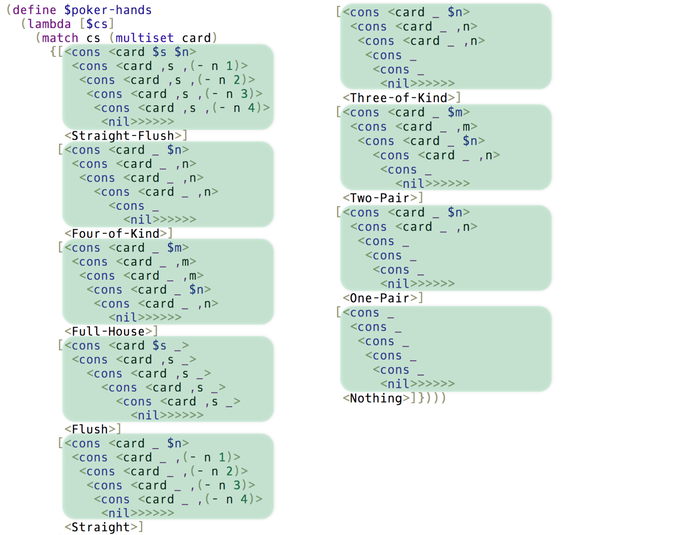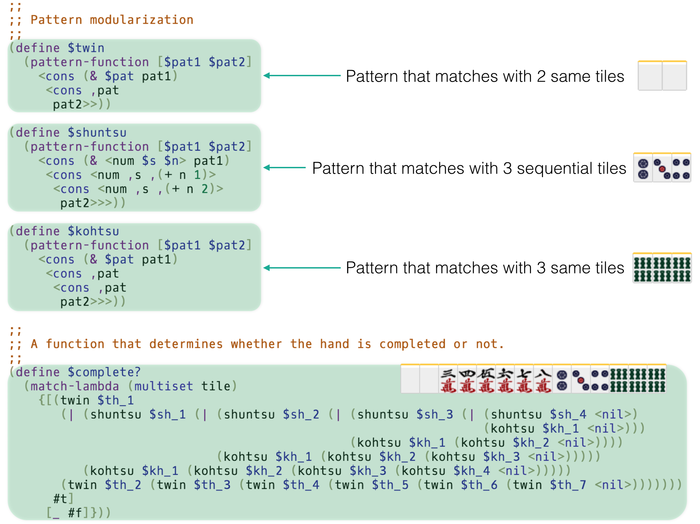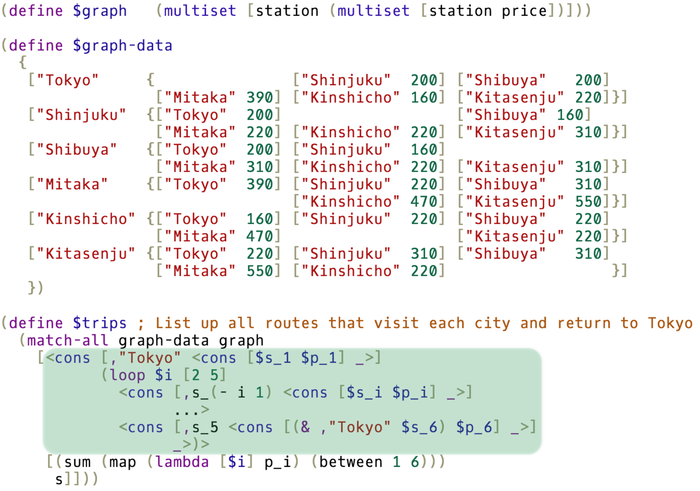The Egison Programming Language

Egison is a functional programming language featuring its expressive pattern-matching facility.
Egison allows users to define efficient and expressive pattern-matching methods for arbitrary user-defined data types including non-free data types such as lists, multisets, sets, trees, graphs, and mathematical expressions.
This is the repository of the interpreter of Egison.
For more information, visit our website.
Refereed Papers
Pattern Matching
Tensor Index Notation
Non-Linear Pattern Matching for Non-Free Data Types
We can use non-linear pattern matching for non-free data types in Egison.
A non-free data type is a data type whose data have no canonical form, or a standard way to represent that object.
For example, multisets are non-free data types because a multiset {a,b,b} has two other syntastically different representations: {b,a,b} and {b,b,a}.
Expressive pattern matching for these data types enables us to write elegant programs.
Twin Primes
We can use pattern matching for enumeration.
The following code enumerates all twin primes from the infinite list of prime numbers with pattern matching!
def twinPrimes :=
matchAll primes as list integer with
| _ ++ $p :: #(p + 2) :: _ -> (p, p + 2)
take 8 twinPrimes
-- [(3, 5), (5, 7), (11, 13), (17, 19), (29, 31), (41, 43), (59, 61), (71, 73)]
Poker Hands
The following code is a program that determines poker-hands written in Egison.
All hands are expressed in a single pattern.
def poker cs :=
match cs as multiset card with
| card $s $n :: card #s #(n-1) :: card #s #(n-2) :: card #s #(n-3) :: card #s #(n-4) :: _
-> "Straight flush"
| card _ $n :: card _ #n :: card _ #n :: card _ #n :: _ :: []
-> "Four of a kind"
| card _ $m :: card _ #m :: card _ #m :: card _ $n :: card _ #n :: []
-> "Full house"
| card $s _ :: card #s _ :: card #s _ :: card #s _ :: card #s _ :: []
-> "Flush"
| card _ $n :: card _ #(n-1) :: card _ #(n-2) :: card _ #(n-3) :: card _ #(n-4) :: []
-> "Straight"
| card _ $n :: card _ #n :: card _ #n :: _ :: _ :: []
-> "Three of a kind"
| card _ $m :: card _ #m :: card _ $n :: card _ #n :: _ :: []
-> "Two pair"
| card _ $n :: card _ #n :: _ :: _ :: _ :: []
-> "One pair"
| _ :: _ :: _ :: _ :: _ :: [] -> "Nothing"
Graphs
We can pattern-match against graphs.
We can write a program to solve the travelling salesman problem in a single pattern-matching expression.
def graph := multiset (string, multiset (string, integer))
def graphData :=
[("Berlin", [("New York", 14), ("London", 2), ("Tokyo", 14), ("Vancouver", 13)]),
("New York", [("Berlin", 14), ("London", 12), ("Tokyo", 18), ("Vancouver", 6)]),
("London", [("Berlin", 2), ("New York", 12), ("Tokyo", 15), ("Vancouver", 10)]),
("Tokyo", [("Berlin", 14), ("New York", 18), ("London", 15), ("Vancouver", 12)]),
("Vancouver", [("Berlin", 13), ("New York", 6), ("London", 10), ("Tokyo", 12)])]
def trips :=
let n := length graphData in
matchAll graphData as graph with
| (#"Berlin", (($s_1,$p_1) : _)) ::
loop $i (2, n - 1)
((#s_(i - 1), ($s_i, $p_i) :: _) :: ...)
((#s_(n - 1), (#"Berlin" & $s_n, $p_n) :: _) :: [])
-> sum (map (\i -> p_i) [1..n]), map (\i -> s_i) [1..n]
car (sortBy (\(_, x), (_, y) -> compare x y)) trips)
-- (["London", "New York", "Vancouver", "Tokyo"," Berlin"], 46)
Egison as a Computer Algebra System
As an application of Egison pattern matching, we have implemented a computer algebra system on Egison.
The most part of this computer algebra system is written in Egison and extensible using Egison.
Symbolic Algebra
Egison treats unbound variables as symbols.
> x
x
> (x + y)^2
x^2 + 2 * x * y + y^2
> (x + y)^4
x^4 + 4 * x^3 * y + 6 * x^2 * y^2 + 4 * x * y^3 + y^4
We can handle algebraic numbers, too.
> sqrt x
sqrt x
> sqrt 2
sqrt 2
> x + sqrt y
x + sqrt y
Complex Numbers
The symbol i is defined to rewrite i^2 to -1 in Egison library.
> i * i
-1
> (1 + i) * (1 + i)
2 * i
> (x + y * i) * (x + y * i)
x^2 + 2 * x * y * i - y^2
Square Root
The rewriting rule for sqrt is also defined in Egison library.
> sqrt 2 * sqrt 2
2
> sqrt 6 * sqrt 10
2 * sqrt 15
> sqrt (x * y) * sqrt (2 * x)
x * sqrt 2 * sqrt y
The 5th Roots of Unity
The following is a sample to calculate the 5th roots of unity.
> qF' 1 1 (-1)
((-1 + sqrt 5) / 2, (-1 - sqrt 5) / 2)
> def t := fst (qF' 1 1 (-1))
> qF' 1 (-t) 1
((-1 + sqrt 5 + sqrt 2 * sqrt (-5 - sqrt 5)) / 4, (-1 + sqrt 5 - sqrt 2 * sqrt (-5 - sqrt 5)) / 4)
> def z := fst (qF' 1 (-t) 1)
> z
(-1 + sqrt 5 + sqrt 2 * sqrt (-5 - sqrt 5)) / 4
> z ^ 5
1
Differentiation
We can implement differentiation easily in Egison.
> d/d (x ^ 3) x
3 * x^2
> d/d (e ^ (i * x)) x
exp (x * i) * i
> d/d (d/d (log x) x) x
-1 / x^2
> d/d (cos x * sin x) x
-2 * (sin x)^2 + 1
Taylor Expansion
The following sample executes Taylor expansion on Egison.
We verify Euler's formula in the following sample.
> take 8 (taylorExpansion (exp (i * x)) x 0)
[1, x * i, - x^2 / 2, - x^3 * i / 6, x^4 / 24, x^5 * i / 120, - x^6 / 720, - x^7 * i / 5040]
> take 8 (taylorExpansion (cos x) x 0)
[1, 0, - x^2 / 2, 0, x^4 / 24, 0, - x^6 / 720, 0]
> take 8 (taylorExpansion (i * sin x) x 0)
[0, x * i, 0, - x^3 * i / 6, 0, x^5 * i / 120, 0, - x^7 * i / 5040]
> take 8 (map2 (+) (taylorExpansion (cos x) x 0) (taylorExpansion (i * sin x) x 0))
[1, x * i, - x^2 / 2, - x^3 * i / 6, x^4 / 24, x^5 * i / 120, - x^6 / 720, - x^7 * i / 5040]
Tensor Index Notation
Egison supports tesnsor index notation.
We can use Einstein notation to express arithmetic operations between tensors.
The method for importing tensor index notation into programming is discussed in Egison tensor paper.
The following sample is from Riemann Curvature Tensor of S2 - Egison Mathematics Notebook.
-- Parameters
def x := [| θ, φ |]
def X := [| r * (sin θ) * (cos φ) -- x
, r * (sin θ) * (sin φ) -- y
, r * (cos θ) -- z
|]
def e_i_j := (∂/∂ X_j x~i)
-- Metric tensors
def g_i_j := generateTensor (\x y -> V.* e_x_# e_y_#) [2, 2]
def g~i~j := M.inverse g_#_#
g_#_# -- [| [| r^2, 0 |], [| 0, r^2 * (sin θ)^2 |] |]_#_#
g~#~# -- [| [| 1 / r^2, 0 |], [| 0, 1 / (r^2 * (sin θ)^2) |] |]~#~#
-- Christoffel symbols
def Γ_i_j_k := (1 / 2) * (∂/∂ g_i_k x~j + ∂/∂ g_i_j x~k - ∂/∂ g_j_k x~i)
Γ_1_#_# -- [| [| 0, 0 |], [| 0, -1 * r^2 * (sin θ) * (cos θ) |] |]_#_#
Γ_2_#_# -- [| [| 0, r^2 * (sin θ) * (cos θ) |], [| r^2 * (sin θ) * (cos θ), 0 |] |]_#_#
def Γ~i_j_k := withSymbols [m]
g~i~m . Γ_m_j_k
Γ~1_#_# -- [| [| 0, 0 |], [| 0, -1 * (sin θ) * (cos θ) |] |]_#_#
Γ~2_#_# -- [| [| 0, (cos θ) / (sin θ) |], [| (cos θ) / (sin θ), 0 |] |]_#_#
-- Riemann curvature
def R~i_j_k_l := withSymbols [m]
∂/∂ Γ~i_j_l x~k - ∂/∂ Γ~i_j_k x~l + Γ~m_j_l . Γ~i_m_k - Γ~m_j_k . Γ~i_m_l
R~#_#_1_1 -- [| [| 0, 0 |], [| 0, 0 |] |]~#_#
R~#_#_1_2 -- [| [| 0, (sin θ)^2 |], [| -1, 0 |] |]~#_#
R~#_#_2_1 -- [| [| 0, -1 * (sin θ)^2 |], [| 1, 0 |] |]~#_#
R~#_#_2_2 -- [| [| 0, 0 |], [| 0, 0 |] |]~#_#
By designing the index completion rules for omitted indices, we can use the above notation to express a calculation handling the differential forms.
The following sample is from Curvature Form - Egison Mathematics Notebook.
-- Parameters and metric tensor
def x := [| θ, φ |]
def g_i_j := [| [| r^2, 0 |], [| 0, r^2 * (sin θ)^2 |] |]_i_j
def g~i~j := [| [| 1 / r^2, 0 |], [| 0, 1 / (r^2 * (sin θ)^2) |] |]~i~j
-- Christoffel symbols
def Γ_j_l_k := (1 / 2) * (∂/∂ g_j_l x~k + ∂/∂ g_j_k x~l - ∂/∂ g_k_l x~j)
def Γ~i_k_l := withSymbols [j] g~i~j . Γ_j_l_k
-- Exterior derivative
def d %t := !(flip ∂/∂) x t
-- Wedge product
infixl expression 7 ∧
def (∧) %x %y := x !. y
-- Connection form
def ω~i_j := Γ~i_j_#
-- Curvature form
def Ω~i_j := withSymbols [k]
antisymmetrize (d ω~i_j + ω~i_k ∧ ω~k_j)
Ω~#_#_1_1 -- [| [| 0, 0 |], [| 0, 0 |] |]~#_#
Ω~#_#_1_2 -- [| [| 0, (sin θ)^2 / 2|], [| -1 / 2, 0 |] |]~#_#
Ω~#_#_2_1 -- [| [| 0, -1 * (sin θ)^2 / 2 |], [| 1 / 2, 0 |] |]~#_#
Ω~#_#_2_2 -- [| [| 0, 0 |], [| 0, 0 |] |]~#_#
Egison Mathematics Notebook
Here are more samples.
There are a lot of existing work for pattern matching.
The advantage of Egison is that it fulfills the following two requirements at the same time.
- Efficient backtracking algorithm for non-linear pattern matching.
- Extensibility of patterns.
Additionally, it fulfills the following requirements.
- Polymorphism of patterns.
- Pattern matching with infinitely many results.
Check out our paper for details.
Installation
Installation guide is available on our website.
If you are a beginner of Egison, it would be better to install egison-tutorial as well.
We also have online interpreter and online tutorial.
Enjoy!
Notes for Developers
You can build Egison as follows:
$ stack init
$ stack build --fast
For testing, see test/README.md.
We have a mailing list.
Please join us!
We are on Twitter.
Please follow us.
License
Egison is released under the MIT license.
We used husk-scheme by Justin Ethier as reference to implement the base part of the previous version of the interpreter.
Egison is sponsored by Rakuten, Inc. and Rakuten Institute of Technology.





